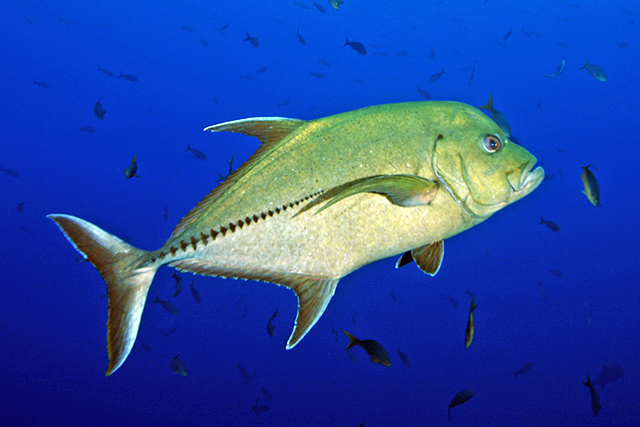| Carangidae (Jacks and pompanos), subfamily: Caranginae |
| 100 cm TL (male/unsexed); max.weight: 18 kg |
|
benthopelagic; marine; depth range 12 - 354 m, oceanodromous |
| Circumtropical. Western Indian Ocean: off Natal and East London in South Africa (Ref. 3197, 11228); Reunion, Mauritius and Cargados Carajos (Ref. 33390); Seychelles (Ref. 10685). Western Pacific: southern Japan to New Caledonia. Recently reported from Tonga (Ref. 53797). Western Atlantic: Bermuda and the northern Gulf of Mexico to Brazil. Eastern Atlantic: Azores, Madeira, St. Paul's Rocks (Ref. 13121), Ascension Island, Cape Verde, and Gulf of Guinea. Eastern Central Pacific: Mexico (including Revillagigedo Islands) to Costa Rica. |
|
Dorsal spines (total): 9-9; Dorsal soft rays (total): 20-22; Anal spines: 3-3; Anal soft rays: 16-19. Description: Head, body, and fins dark olive grey to brown or black dorsally, shading to bluish gray ventrally; median fins and lateral line scutes usually dark brown or black (Ref. 90102, Ref. 13442). Body oblong and compressed, dorsal profile strongly convex anteriorly, ventral profile slightly convex; breast completely scaleless; LL scutes 26-33, strong (Ref. 90102). Upper profile of head steep, the anterior part slightly concave; mouth relatively large, the maxilla nearly reaching center of eye (Ref. 13442). Adipose eyelid moderately developed, small anteriorly extending forward to rear half of pupil on posterior part of eye (Ref. 90102). |
| An oceanic and insular species, very much restricted to clear oceanic waters (Ref. 9283). Not commonly found in shallow banks (Ref. 9283). Sometimes seen near drop-off at outer edge of reefs (Ref. 26938). Occasionally forming schools. Feed on fishes at night (Ref. 5213). Eggs are pelagic (Ref. 4233). Marketed mainly fresh, also dried or salted (Ref. 9283). |
|
Least Concern (LC); Date assessed: 20 August 2012 Ref. (130435)
|
| reports of ciguatera poisoning |
Source and more info: www.fishbase.org. For personal, classroom, and other internal use only. Not for publication.
